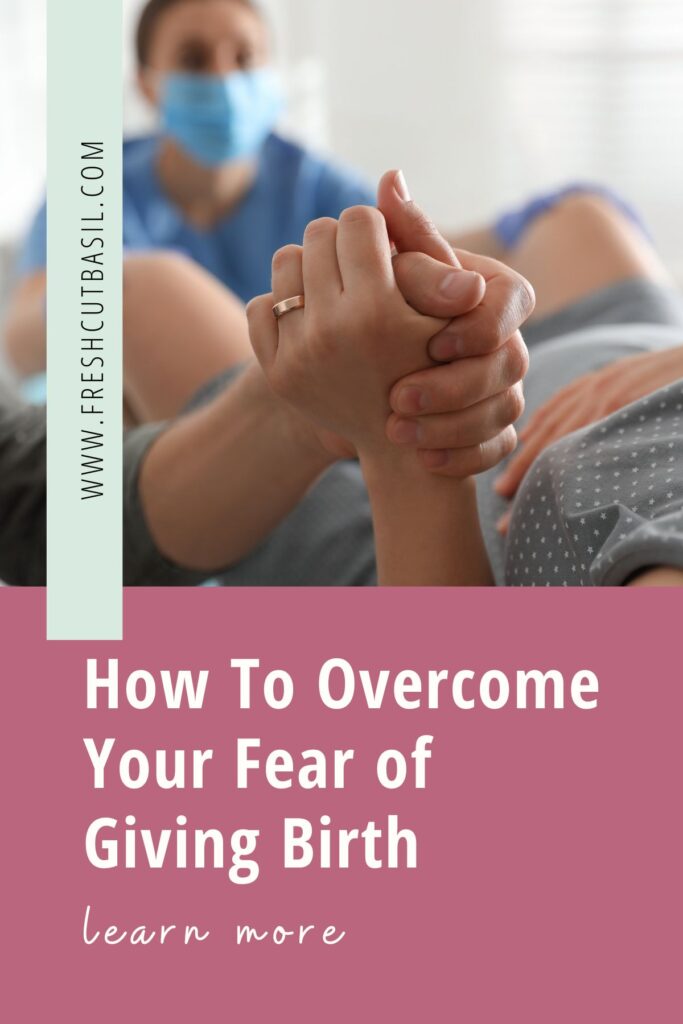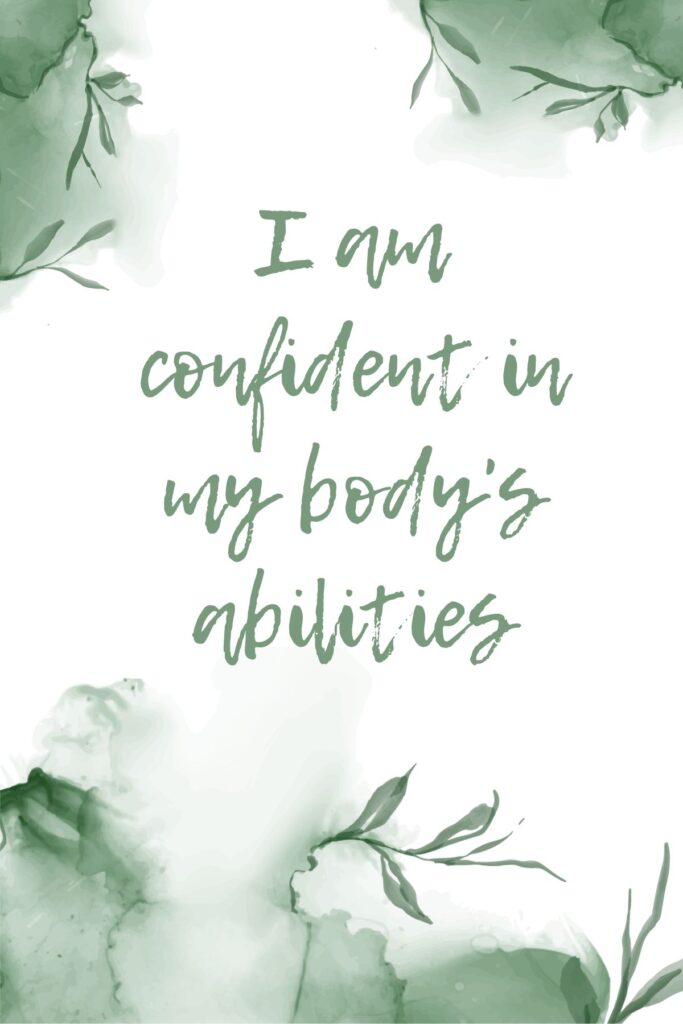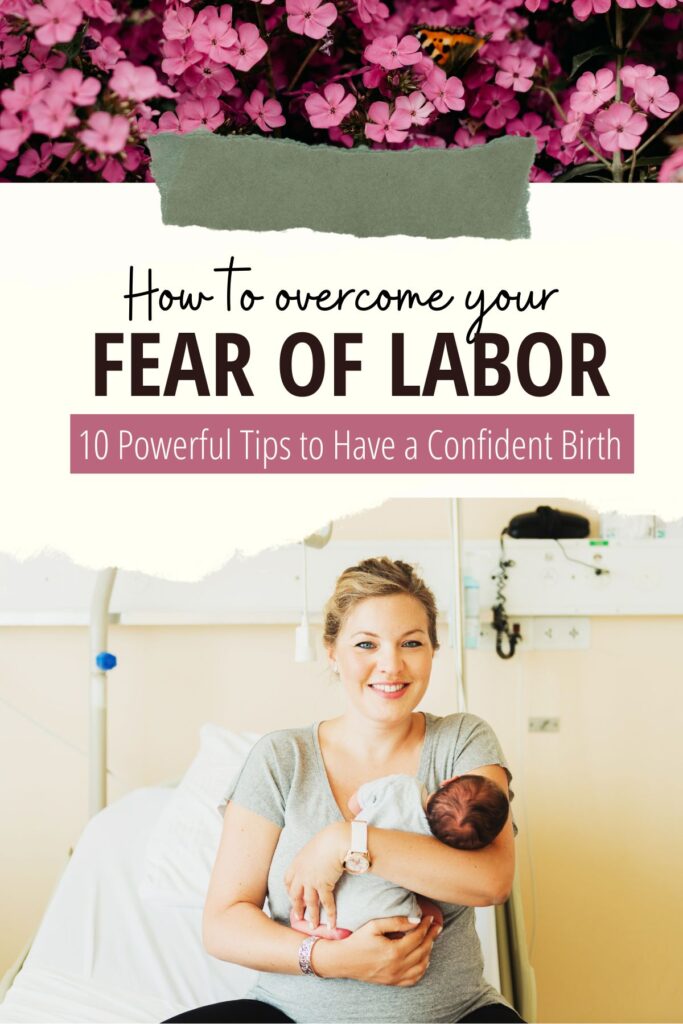It’s not uncommon to have some fears surrounding giving birth. Here are 10 tips to help you overcome your fear of birth and have a positive and empowering birth experience.

This post may contain affiliate links. See my full disclosure policy here for more details.
Fear of Birth
Whether it’s your first or fifth pregnancy, it’s not uncommon to have some fears surrounding giving birth.
I’ve been there!
While birth is not a medical emergency, our society today has made birth seem like such a scary, dangerous thing.
In some ways a little bit of fear can be beneficial if it motivates you to act and work on those things that are causing you anxiety.
However, fear can also hold you back. Working to overcome your fear will give you power to achieve the birth you want.
*It is important to point out that even though it is well known that pregnancy and birth can cause anxiety, especially in the third trimester, an extreme fear of pregnancy and childbirth to the point of avoidance by any means possible is called Tokophobia1. Please see your doctor if you believe you may have this condition.
While I was pregnant as a first time mom, I was so excited to meet my baby, but was really really afraid of giving birth.
I felt like all I had heard were horror stories. Plus, movies always depict women screaming in pain while in labor and it didn’t look fun.
I knew it was important to work on my fears and I was so surprised and happy to see the progress that I made as I did.
Here I’ll share the tips I used to be able to go from having a paralyzing fear of childbirth to having a confident, empowering birth experience.

1. Identify Your Fears
Before being able to work through your fear or fears, it is important to be able to identify exactly what it is that you’re afraid of.
For some, it may be a fear of pain, for others, a fear of complications or having a c-section. It could also be a fear of the unknown, since no two births are exactly the same. It’s also common for fears to surround the postpartum period or caring for a newborn.
Often, fear can come from having a difficult or traumatic previous birth and not wanting that to happen again.
Regardless of what your fears are, the first step needs to be identifying what it is you’re afraid of and when those fears come up for you.
For me, I knew that I was afraid of giving birth, but wasn’t sure exactly why at first.
After doing some introspection, I discovered that I was really afraid of not being able to handle pain and I was also worried about needing interventions or surgery.
In the past, I have had a low pain tolerance and I had heard how intense the pain can be during labor.
Just identifying those fears allowed me to recognize what I was facing and only then was I able to start working on that.
2. Write Down Your Fears
Journaling is an excellent way to process your emotions, including fear.
Repressing fear can cause the body to store that emotion deep down and it will undoubtedly cause issues at some point. Writing things down can help you get them out and then you’ll be able to face them.
It will also be able to help you track you fears and you’ll be better able to recognize patterns and be more aware of what you are feeling.
While writing down your fears, be sure to write what you were doing when the fears came up, what kind of feelings it brings up for you and where in your body you feel that fear.
3. Learn About Birth
The best remedy for fear is education. Once you’ve identified what it is you’re afraid of, begin learning as much as you can about that topic.
For me, learning about pain management techniques was the most beneficial for reducing my fear of pain during childbirth.
I did everything I could to learn about birth from different sources including reading books, listening to podcasts, watching youtube, talking to my midwife and doula, reading positive birth stories, and taking a birth course.
“The best remedy for fear is to gain knowledge.”
Debasish Mridha
Books About Birth
There are tons of books out there about giving birth that range in length and focus. I recommend reading a couple to learn from different perspectives and to find something that resonates with you.
Here are a few favorites that are helpful with overcoming fears surrounding childbirth:
Birthing from Within: Extraordinary Childbirth Preparation
The Birth Book: Everything You Need to Know to Have a Safe and Satisfying Birth
Podcasts
There are two podcasts that I felt were very helpful in preparing for birth. They are:
Both of these are geared toward having an unmedicated birth. Let me know in the comments if there are other podcasts you have found helpful.
Birth Course
Taking a birth course was by far the most helpful tool for me to be able to learn about birth and to have to tools I needed to have an empowering and confident birth.
My husband and I attended an in-person birth class taught by our doula that offered hands-on help to learn about coping mechanisms for birth.
Most hospitals offer in-person classes. Sometimes they are free, but our hospital charged a fee.
I feel so lucky to have found an incredible birth course called “How to Give Birth with Practically No Pain” by the Mighty Mama Movement.
I was particularly drawn to this course because my fears around birth were mostly focused on pain.
It is an online course with a series of videos about everything from pregnancy, birth, and postpartum. It is taught by a mother of 8 and her midwife and they share so much valuable information.
This was the course that really allowed me to overcome my fears and gave me the confidence to plan for an unmedicated birth. You can read about my experience with the course here.
They also teach a really awesome free webinar that you can access here. In the webinar, they teach 3 skills to help you manage pain during labor.

4. Share Your Fears with Your Provider
Whether you choose a Midwife or an OB/GYN, there likely isn’t anything they haven’t seen.
They’re able to go into more detail about any concerns you have and how those can be addressed.
One of the reasons I chose to go with a Midwife over an OB/GYN is that they are able to spend a lot more time with you during routine visits and during the birth itself.
Either way, make sure that you choose a provider you trust and one who will answer your questions and help you feel confident about having them on your birth team.
5. Consider Hiring a Doula
A doula does not have formal training in obstetrics, but they are able to support you during birth in a variety of ways.
Doulas often offer prenatal support and can answer any questions you have before giving birth. They can also teach you different methods of handling symptoms during labor.
They will become familiar with your birth plan and can advocate for you if you are unable to do so for yourself.
Having a doula as a support can provide peace knowing that they have helped many other women like you.
They can also provide tools and resources you may not have thought of.
Having a doula to support you during pregnancy and labor can definitely help ease your fear of giving birth.
6. Create a Birth Plan
Giving birth is a beautiful and natural process, but it does not always go as planned.
However, having a birth plan can provide you with peace of mind knowing that your birth team understands your preferences and hopes for your experience.
The process of creating a birth plan is a good opportunity to explore all of the options available to you during birth. Then you can make specific decisions based on your goals.
Going over your birth plan with your partner and your provider can give you the chance to address specific things that are worrying you.
7. Read Positive Birth Stories
One of the most impactful things I did when working to overcome my fears of giving birth was to read (and listen to) positive birth stories.
Unfortunately, people love to share their traumatic birth stories which can only add to your fears.
Conversely, reading or listening to positive birth stories can help you gain confidence in yourself and the birth process.
An incredible part of the birth course I took is that they have a Facebook page you can join where women share their birth stories and what they did to prepare.
They use the hashtag #postivebirthstory that helps you search for hundreds of positive experiences.
I loved being able to read the stories of so many women like me, because it helped me feel like I could do that too.
It was also helpful that there are positive stories of c-section births, births with an epidural, and unmedicated birth stories.
This allowed me to see that giving birth can truly be a good experience in a variety of circumstances.
Filling my mind with those positive stories really helped dispel my fears. You can read about my own positive birth story here.
8. Practice Meditation
Meditation is a practice that helps you focus your mind to achieve clarity and focus. It can also help to calm your fears.
Meditating is a powerful way to remind your body that you are safe. The more often you can think about birth while assuring your body that you are safe, the more likely it is that you will be able to go into that calm state during labor.
Fear increases tension which increases pain. Practicing deep relaxation and meditation reduces tension in the body.
During pregnancy, I spent time every day meditating. It helped me to follow guided meditation so I didn’t just fall asleep (pregnancy is exhausting).
It helped to go through each part of my body in my mind and consciously relax that area.

9. Use Birth Affirmations
Positive affirmations give power to your mind.
Giving birth is obviously a lot of physical work, but it is also a lot of mental and emotional work. It is just as important to prepare your mind as it is your body.
Just like reading positive birth stories can give you confidence, going through daily positive birth affirmations will remind your body that you are safe and capable.
The more you can fill your mind with empowering statements, the more confidence you will have.
Having and creating faith in yourself will dispel many of your fears.
You can hang affirmations on your mirror in your bathroom, write them in a journal, use flashcards, or put them in your phone.
Do what works best for you to be able to read them daily and work them into your subconscious.
10. See a Therapist
Working with a trained professional can help you work through fears you in a way you can’t on your own.
They can provide new insight and perspective on your situation and can offer ideas on how to work through things.
Sharing your fears will help you identify the source of those fears and then give you the skills to release them.
I found it helpful to meet with someone consistently during pregnancy to work on my mindset.
Remember that you are powerful, you are capable, and you can do this! There are lots of resources out there to help you and there is no shame in seeking help.
If you found this post helpful, share it on Pinterest so others can find these tips!

Sources
- Tokophobia: An unreasoning dread of childbirth https://www.cambridge.org/core/journals/the-british-journal-of-psychiatry/article/tokophobia-an-unreasoning-dread-childbirth/492B8EB19D16A2BD455E6BE7539564C9







1 thought on “How to Overcome Your Fear of Birth”